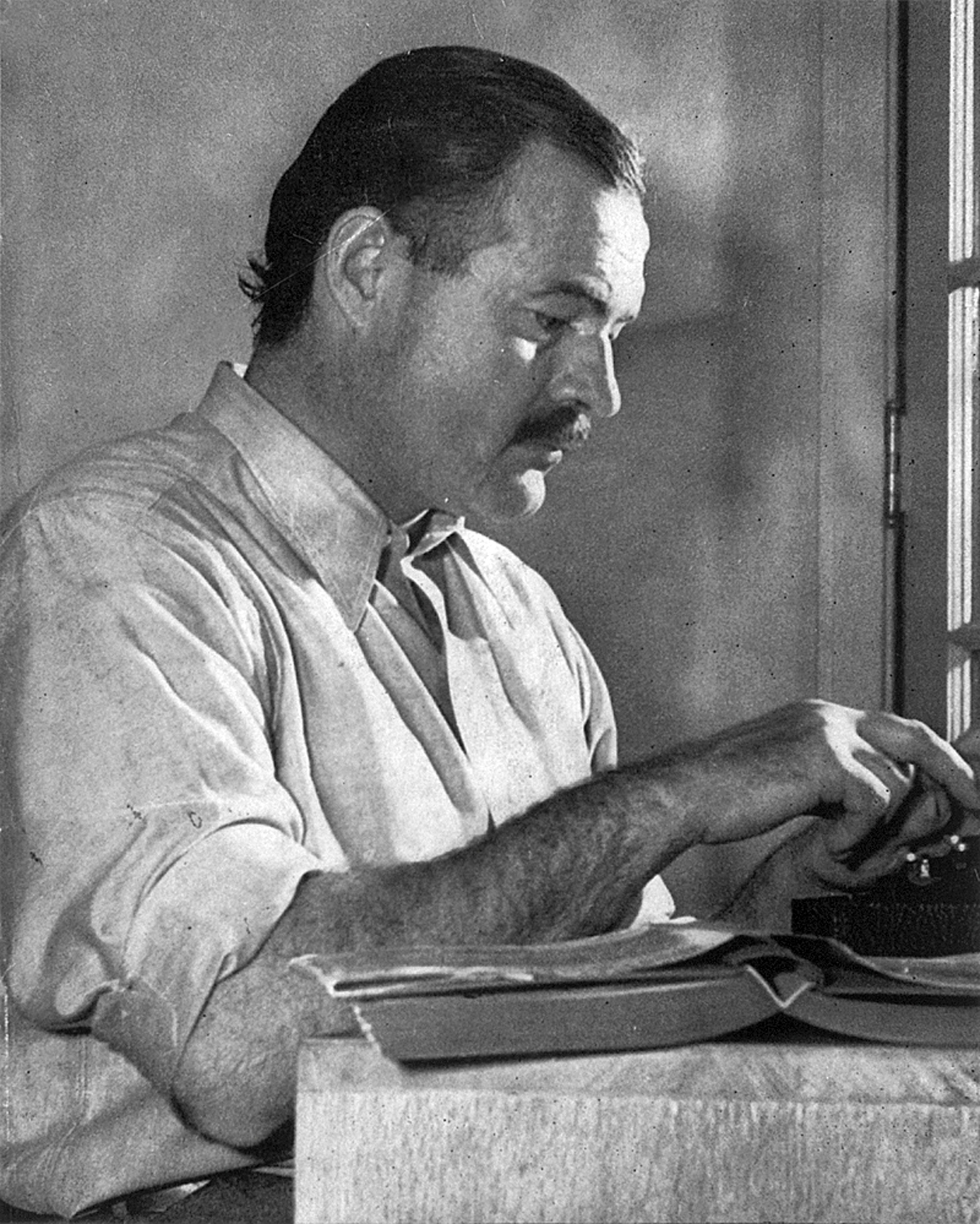“We all take a beating every day, you know, one way or another.”
Source: The Short Happy Life of Francis Macomber
Uncover Hemingway's timeless wisdom. His iconic quotes explore love, happiness, writing, and self-discovery. Experience the profound complexity and beauty of life through his inspiring words.
Ernest Miller Hemingway was an influential American novelist, short-story writer, and journalist known for his economical and understated writing style. His work, which embodied his iceberg theory, had a significant impact on 20th-century fiction. Hemingway lived a daring lifestyle and cultivated a public image that earned him admiration from subsequent generations. He received the prestigious Nobel Prize in Literature in 1954 for his contributions to the literary world. Over his career, Hemingway published an impressive body of work that includes seven novels, six short-story collections, and two nonfiction books. Several more of his works were released posthumously, solidifying his place as one of America's literary greats.
Raised in Oak Park, Illinois, Hemingway briefly worked as a reporter for The Kansas City Star after finishing high school. However, he soon decided to enlist as an ambulance driver during World War I and served on the Italian Front. Unfortunately, he sustained severe wounds in 1918 and returned home. These wartime experiences heavily influenced his acclaimed novel A Farewell to Arms. In 1921, Hemingway married Hadley Richardson before moving to Paris where he worked as a foreign correspondent for the Toronto Star. During this time, he came into contact with the modernist writers and artists of the "Lost Generation" expatriate community in Paris—an experience that profoundly shaped his writing style. He published his first novel, The Sun Also Rises, in 1926 and subsequently divorced Richardson before marrying Pauline Pfeiffer. His coverage of the Spanish Civil War fueled his book For Whom the Bell Tolls while also resulting in another divorce with Pfeiffer. Later on, Martha Gellhorn became Hemingway's third wife until they separated when he met Mary Welsh during World War II in London. As a journalist covering significant historical events like the Normandy landings and the liberation of Paris alongside Allied troops, Hemingway played an active role in war reportage. He had permanent residences in Key West, Florida throughout the 1930s and in Cuba during the 1940s and 1950s. Hemingway's life took a tragic turn during a trip to Africa in 1954 when he was involved in two plane accidents within consecutive days that left him with lifelong pain and health issues. Ultimately, he died by suicide at his house in Ketchum, Idaho, in mid-1961.

“We all take a beating every day, you know, one way or another.”
Source: The Short Happy Life of Francis Macomber
“I don’t know. There isn’t always an explanation for everything.”
Variant: There isnt always an explanation for everything.
Source: The Sun Also Rises
“He did not say that because he knew that if you said a good thing it might not happen.”
Source: The Old Man and the Sea
“I know you're right. I'm just low, and when I'm low I talk like a fool.”
Source: The Sun Also Rises
Source: A Moveable Feast
Source: Islands in the Stream
“Do you always get so hungry when you make love?”
“When you love somebody.”
Catherine and David Bourne in Ch. 1
Source: The Garden of Eden (1986)
Context: But I get so hungry,' she said. 'Is it normal do you think? Do you always get so hungry when you make love?'
'When you love somebody.
“I wanted to try this new drink: That's all we do, isn't it - look at things and try new drinks?”
Source: The Complete Short Stories
Source: The Old Man and the Sea
“I've been in love (truly) with five women, the Spanish Republic and the 4th Infantry Division.”
Letter to http://www.telegraph.co.uk/news/worldnews/1547504/Hemingway-and-Dietrich-letters.html?service=print Marlene Dietrich (1 July 1930)
Source: For Whom the Bell Tolls (1940), Ch. 13
“You never understand anybody that loves you.”
Pt. 3: At Sea, Section 21 (the last sentence of the novel)
Islands in the Stream (1970)
Introduction to Treasury of the Free World (1946)
Paris Review interview (1958)
Letter to Esquire editor Arnold Gingrich (11 April 1935); published in Ernest Hemingway: Selected Letters 1917–1961 (1981) edited by Carlos Baker
“You're beautiful, like a May fly.”
Statement to his future wife Mary Welsh, recalled in her obituaries (26 November 1986)
Source: Death in the Afternoon (1932), Ch. 7
Letter to F. Scott Fitzgerald (13 September 1929); published in Ernest Hemingway: Selected Letters 1917–1961 (1981) edited by Carlos Baker
“Everybody is friends when things are bad enough.”
Pt. 3: At Sea, Section 17
Islands in the Stream (1970)
The Old Man and the Sea (1952)
"The Snows of Kilimanjaro," first published in Esquire (August 1936); later published in The Fifth Column and the First Forty-Nine Stories (1938). Originally in Esquire "Julian" was named as F. Scott Fitzgerald, who, in "The Rich Boy" (1926) had written: "Let me tell you about the very rich. They are different from you and me. They possess and enjoy early, and it does something to them, makes them soft where we are hard, and cynical where we are trustful, in a way that, unless you were born rich, it is very difficult to understand..." Fitzgerald responded to this in a letter (August 1936) to Hemingway saying: "Riches have never fascinated me, unless combined with the greatest charm or distinction."
As quoted in The New York Times Book Review (7 November 1954)
Source: The Dangerous Summer (1985), Ch. 1
“However you make your living is where your talent lies.”
"The Snows of Kilimanjaro," first published in Esquire (August 1936); later published in The Fifth Column and the First Forty-Nine Stories (1938)
“A bottle of wine was good company.”
The Sun Also Rises (1926)
Introduction to Treasury of the Free World (1946)
Helen Gordon to her husband Richard Gordon in Ch. 21
To Have and Have Not (1937)